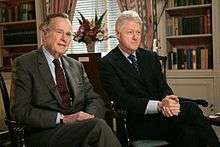Bush–Clinton era

The Bush–Clinton era, alternatively described as the Clinton–Bush era, is a term used by some political journalists and commentators to describe the period in United States federal and presidential political history from 1980 to 2016 when the Bush and Clinton families held significant political power.[1][2][3]
In the 2016 presidential elections, members of both families ran for president, but both were defeated in their bids by Donald Trump, who defeated Jeb Bush in the Republican primaries and Hillary Clinton in the general election.
Definition
The Bush–Clinton era covers the Presidencies of Ronald Reagan, George H. W. Bush, Bill Clinton, George W. Bush & Barack Obama. The Bush–Clinton era began in 1979 when Bill Clinton became Governor of Arkansas. It continued with George H. W. Bush's election as Vice President of the United States in 1980, and with his election as President in 1988 and his candidacy for re-election in 1992. The Bush–Clinton era further expanded with Bill Clinton's and George W. Bush's two terms each from 1993 to 2009. The term is frequently used to discuss the interconnected dynastic success of these two families over the course of over thirty years. From 1981 to 2009, a Bush or Clinton was President or Vice President of the United States.
The Bush family was already prominent in federal politics prior to George H. W. Bush's election as Vice President; his father Prescott Bush had been a U.S. Senator from Connecticut from 1952 until January 1963
This period also encompasses the non-federal elections of Bill Clinton as governor of Arkansas from 1979 to 1981 and again from 1983 to 1992, George W. Bush as governor of Texas from 1995 to 2000, and Jeb Bush as governor of Florida from 1999 to 2007. Jeb Bush's governorship overlapped with his brother's governorship for two years and with his brother's presidency for six years.
After her tenure as First Lady ended, Hillary Clinton served as a U.S. Senator from New York, which overlapped with the presidency of George W. Bush. Hillary Clinton then served as Secretary of State during Obama's first term. From 2013–2016 while neither a Bush nor Clinton held a federal public office, Jeb Bush and Hillary Clinton were seen as favorites for their respective party's presidential nominations.
The era ended in 2016 when in the 2016 presidential elections, members of both families ran for president, but both were defeated in their bids by Donald Trump, who defeated Jeb Bush in the Republican primaries and Hillary Clinton in the general election.
Themes
Numerous political themes run through the presidential terms. All three presidencies were marked by divided government, bitter partisanship, corruption, and political anxiety, especially with the several scandals of Bill Clinton's and George W. Bush's presidencies. All three presidents promoted an expansion in the size and scope of government and an expansive monetary policy, managed by the Federal Reserve. There were several economic bubbles during this time, most notably the dot-com bubble (1993-2000) and the housing bubble (2003-2007). All three presidents initiated military operations in Iraq aimed at limiting and ultimately removing Saddam Hussein from power, and Reagan also took a large and active role in watching over the situation in Iraq during his Presidency. Further, the re-positioning of the United States in the post Cold War era and the rise of anti-U.S. terrorism became priorities.
Family relations
George H. W. Bush and Bill Clinton, despite having been opponents in the 1992 election, have since had amicable relations. Since 2001, Clinton and Bush have become especially good friends and maintained strong teamwork and relationships. Outside politics, the two of them have worked together on a number of important issues, such as relief for victims of 2004 Indian Ocean earthquake and Hurricane Katrina, lending their combined influence to charities and awareness initiatives. They were jointly awarded the 2006 Philadelphia Liberty Medal for their work on the Bush-Clinton Katrina Fund and Bush-Clinton Tsunami Fund.[4] After his 2008 presidential run and electoral victory, current President Barack Obama has also formed close relations with these two former Presidents. The five currently living Presidents (Jimmy Carter, George H. W. Bush, Bill Clinton, George W. Bush, and Obama) all posed inside the Oval Office and had lunch together before Obama's inauguration in January 2009. They also joined Clinton Bush Haiti Fund when there was an earthquake in Haiti. They've also helped together to help relief areas in New Jersey from Hurricane Sandy and in 2013 from Typhoon Haiyan in the Philippines.
Chronology
Federal positions
- Prescott Bush - United States Senator from Connecticut (1952-1963)
- George H.W. Bush - U.S. Representative from Texas (1967-1971)
- George H.W. Bush - Director of Central Intelligence (January 30, 1976 – January 20, 1977)
- George H. W. Bush - Vice President (1981-1989)
- George H.W. Bush - President (1989-1993)
- Bill Clinton - President (1993-2001)
- George W. Bush - President (2001-2009)
- Hillary Clinton - U.S. Senator from New York (2001-2009)
- Hillary Clinton - U.S. Secretary of State (2009-2013)
Non-federal positions
- Bill Clinton - Governor of Arkansas (1979-1981, 1983-1992), Attorney General of Arkansas (1977-1979)
- George W. Bush - Governor of Texas (1995-2000)
- Jeb Bush - Governor of Florida (1999-2007), Florida Secretary of Commerce (1987-1988)
- George P. Bush - Texas Land Commissioner (2015–Present)
See also
- History of the United States (1980-1991)
- History of the United States (1991-present)
- Sixth Party System
References
- ↑ "New Hampshire Voters Take Independent Tack". Blog.washingtonpost.com. Retrieved 2013-04-23.
- ↑ The BC Era Archived October 25, 2007, at the Wayback Machine.
- ↑ "Bush-Clinton: What Went Wrong?". Cato.org. 1996-11-13. Retrieved 2013-04-23.
- ↑ "2006 Philadelphia Liberty Medal Award".